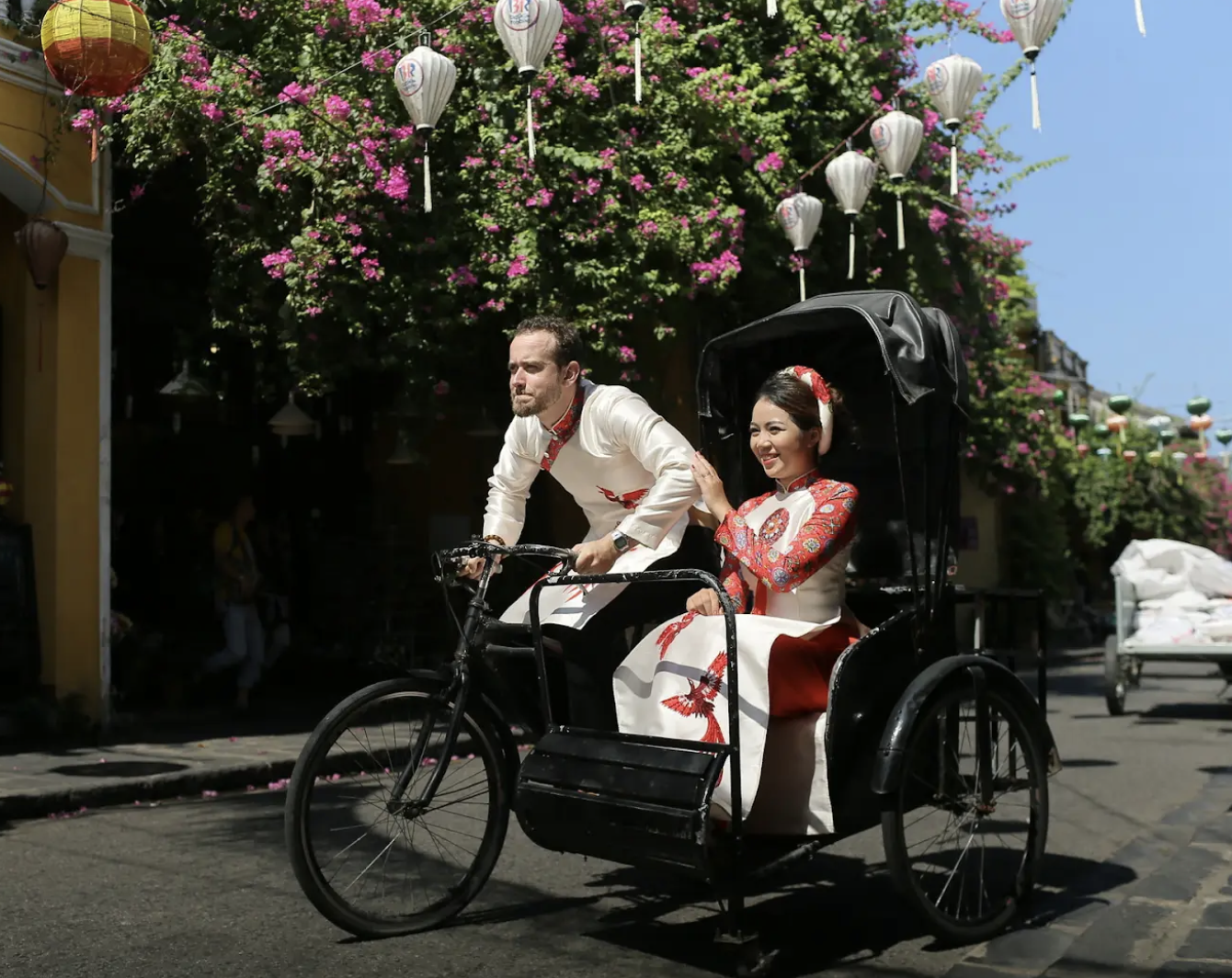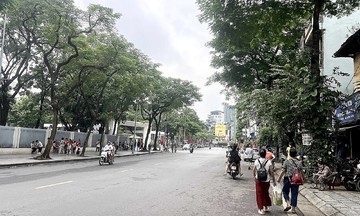Ben's attempts to teach his mother words like "cai bon" (table), "xe dop" (bicycle), "o coa" (fish pond), and "non loa" (conical hat) have amused many and sparked admiration for his grasp of the Quang Nam dialect.
"I can't believe this guy learned Vietnamese with an advanced curriculum," one commenter wrote. The Quang Nam dialect, or the way Vietnamese is pronounced in Quang Nam province, is a challenge for Vietnamese people from other provinces, but it's familiar to Ben.
"I'm practicing to speak with Vietnamese people so that when they close their eyes, they'll think they're talking to someone from Tam Ky," he said. His inspiration for learning the Quang Nam dialect is his wife, who is from Da Nang.
Ben, originally from Perth, Australia, moved to Da Nang to live and teach English in 2016. Within six months, he fell in love with the culture, people, and food, feeling like Vietnam was truly his home.
His language learning journey began then, despite friends warning him that "Vietnamese is very difficult" and many giving up quickly. Back in Australia, Ben had learned and become fluent in French, also considered a difficult language. "But French is nothing compared to Vietnamese," Ben said. "The hardest part is the tones; a slight change in pitch can completely change the meaning."
Initially, his teacher was from northern Vietnam. Later, he studied with a teacher from Da Nang. Although he didn't intend to speak with a southern accent, his intonation leaned towards southern and central dialects.
In 2017, Ben met and fell in love with Trang, a woman from Da Nang, five years his junior. They married in 2019, solidifying his motivation to learn Vietnamese. He enjoyed Trang's Quang Nam accent when she chatted with friends and was curious about the jokes his father-in-law made during social gatherings.
"When I hear the central dialect, I feel like I'm at home," Ben said. He searched Google for Quang Nam dialect classes but found none. There were no textbooks or learning materials available, only the option of listening to locals speak.
After about three months of exploration, Ben realized the tones, sounds, and expressions in the Quang Nam dialect weren't inherently difficult, but converting them into spoken conversation was the real challenge.
He deduced some rules: people often pronounce the vowel 'a' as 'o' and 'e' as 'i'. For example, "cai ban" (table) becomes "cai bon," and "chiec la" (leaf) becomes "chiec loa." He also encountered interesting words like "rang" (why), "chi" (what), "man" (do), "no" (no), "mo" (where), "no" (that), and "te" (over there).
"Every time I speak, I have to think and concentrate very hard," he said. In his free time, Ben watched comedy videos by artist Truong Giang. When he didn't understand, his wife explained; otherwise, he mostly self-studied.
 |
Ben and his wife in Hoi An in 2019. Photo: Provided by the subject |
Many of Ben's foreign friends had given up on Vietnamese due to its unfamiliar tones, afraid of sounding strange. However, Ben, even when mispronouncing words while counting in the Quang Nam dialect, was never laughed at. In contrast, back in Australia, people were often self-conscious about strong regional accents, fearing judgment.
"Local accents are cherished as part of cultural identity here," he said. "Learning a language completely different from your native tongue requires courage."
For over eight months, Ben participated in online Vietnamese conversation groups to improve his fluency. He became so proficient in the Quang Nam dialect that people were skeptical, suspecting he was either Vietnamese-Australian or someone from Quang Nam pretending to be Australian. "I eventually had to turn on my webcam to prove I was really Australian," Ben recalled.
In 2020, after the birth of their son, Ben and his wife returned to Perth. He now manages a wine and deli shop, continuing his Vietnamese studies during evenings and weekends, a more challenging endeavor without the immersive environment.
Noticing his Quang Nam accent fading, Ben created YouTube and TikTok channels to motivate himself to speak daily. He incorporated the language into his Australian life, ordering banh mi nem nuong (grilled pork baguette), che (sweet dessert), and banh trang nuong (grilled rice paper) in Vietnamese at local eateries. He taught his mother simple phrases and occasionally played bau cua (a Vietnamese dice game) with her during Tet (Lunar New Year).
Ben cherishes phone conversations with his wife's family, all of whom are from Quang Nam. "For me, learning isn't just a personal hobby; it's a way to connect with my wife and her homeland," he said.
Trang, in turn, admires her husband's self-discipline. Due to her busy schedule, she hasn't formally taught him, only answering his questions. While his vocabulary isn't extensive, Ben focuses on correct pronunciation and grammar. "His reading and writing are excellent. When we were in Da Nang, his pronunciation was even better," Trang commented.
Over the past few years, Ben has actively participated in Vietnamese community events in Perth.
Cao An, 26, met Ben at the Vietnamese Spring Festival, co-organized by the University of Western Australia and the Vietnamese Consulate, in early 2025.
An was initially surprised to hear a foreigner not only speak Vietnamese clearly but also with a Quang Nam accent. Ben even interviewed attendees about their preference for pho or bun bo (beef noodle soup). They stayed in touch after the event and became friends.
"He's diligent, studies daily, and uses local vocabulary, demonstrating a genuine desire to understand and integrate into the language," An said.
Ngoc Ngan












